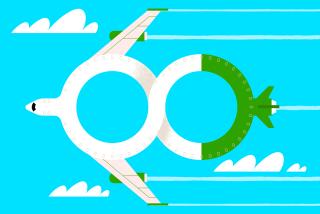Plane Speaking: A Primer on Airline Vocabulary
- Share via
What could be worse than scoring an APEX ticket from a CRS, then languishing in the airport after being bumped from a code-shared flight?
Not knowing what an APEX ticket is, or a CRS, or how bumping and code-sharing work might be worse, and I suspect it’s a common affliction. Unless you fly frequently, you may not encounter these terms often enough to conquer them for vacation-planning purposes.
Like every corner of the travel industry, the airline business resonates with a language all its own. Since my column on hotel terminology (“A Mini-Lexicon of Hotel Keepers’ Confusing Lingo,” Travel Insider, July 16), I’ve been thinking more about the almost foreign languages consumers face. In this year of record bookings on airlines--and multiplying complaints over the behavior of those airlines--an airline lexicon seemed like a logical next step, so here’s an air traveler’s glossary.
APEX fare. A discounted, restricted, coach-class fare on an international flight. It’s been called an APEX for about 25 years, says Terry Trippler, a travel expert for the Internet site 1travel.com, as shorthand for “advance purchase excursion.”
Blackout dates. For those who hoard frequent-flier miles, these are hated words. These are the popular travel dates (often spring break, midsummer and around Thanksgiving and Christmas) for which airlines often will not issue a ticket for accumulated miles. The number of blackout dates can vary widely from airline to airline and destination to destination. As frustration has grown over the inability to use mileage awards on these high-demand days, many carriers now offer an alternative: You use more miles to obtain a seat on dates that would normally be blacked out. At Northwest Airlines, for instance, such tickets are called “rule-busters”; they cost 50,000 WorldPerks miles for any round-trip ticket in the continental U.S. from June through August. The same ticket any other time except blackout dates costs 25,000 miles.
Bumping. There are two kinds of bumping. The more common one is voluntary, in which an airline remedies an overbooking problem by asking for volunteers to take a later flight. As an incentive, airlines may offer credits toward future flights or upgrades. (No federal rules apply, so it’s a question of negotiation between you and the gate agent.) If there aren’t enough volunteers, the airlines resort to involuntary bumping. In those cases, federal guidelines apply, and airlines are required to get you to your destination and give you as much as $400 compensation for your trouble.
Code sharing. When two airlines, such as United and Lufthansa, strike up a marketing alliance that allows them to list each other’s flights as their own, they are code sharing. Thus United may show up on computer screens as the name on a flight from Chicago to Frankfurt, but if it’s a code-share flight, the same jet will be listed as a Lufthansa departure with a different flight number. In the end, both groups of passengers board the same aircraft, which may say either Lufthansa or United on the side. Code-share alliances are common among the airlines of North America and Europe.
Consolidators. These companies buy airline tickets directly from the carriers at cut rates, then resell them to travel agents, tour operators and sometimes the public. Consolidator tickets can undercut published fares by 20% or even 40%, but frequently come with more restrictions than conventionally purchased tickets. If you have a travel agent who hasn’t been able to find the air fare you want, ask whether the agent has checked any consolidators. Because of the added restrictions (such as limited ability to change flights), some agents and travelers are reluctant to use them.
CRS. Computerized reservations system. Most travel agents use these to book tickets.
Direct flight. Not to be confused with a nonstop flight. “Direct” means you don’t change aircraft, but a direct flight stops once or more on the way to its final destination.
E-ticket. Electronic ticketing, which allows travelers to make reservations that are held in airlines’ computers, without a paper ticket. (Travelers must show photo identification at the airport.)
Fuel surcharge. This may sound like a government tax, but it isn’t. It’s the terminology adopted by most of the major airlines to pass along their added fuel costs--typically $20 on a round-trip ticket--without adjusting the base fares shown on travel agents’ computers to reflect the full increase. (Airline price-quoting practices vary widely on Internet sites and other advertising venues.) Be sure to ask either the airline or a travel agent whether the price includes a fuel surcharge.
Liability limits. This is the fine print that generally limits an airline’s liability if it delays, loses or damages your baggage. On a domestic trip, the airline can invoke a ceiling of $2,500 per passenger. (That’s up from $1,250, which was the limit until January.) On international trips, the liability limit is $9.07 per pound or $20 per kilo (about 2.2 pounds).
Yield management. This is the increasingly complex system of variable fares that allows airlines to maximize their passenger revenue as the departure date draws near and demand ebbs and flows. The more sophisticated yield management gets, the more different types of fares the airlines create, and the more frequently those prices change. In a single flight’s coach class, you may find passengers who paid half a dozen different fares. Last year, industry statistics show, the average plane flew 71% full--the highest it’s been in the last decade.
NEXT WEEK: Cruise ship terminology.
*
Christopher Reynolds welcomes comments and suggestions, but cannot respond individually to letters and calls. Write Travel Insider, L.A. Times, 202 W. 1st St., Los Angeles, CA 90012, or send e-mail to chris.reynolds@latimes.com.
More to Read
Sign up for The Wild
We’ll help you find the best places to hike, bike and run, as well as the perfect silent spots for meditation and yoga.
You may occasionally receive promotional content from the Los Angeles Times.







